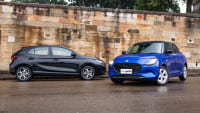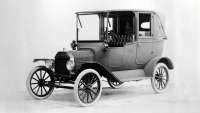Everybody loves the feel of a new car, but decidedly less people like the costs associated with refueling one.
The good news is cars are now more fuel efficient than ever before. As fuel prices rise and emissions regulations take hold in much of the world, car manufacturers are constantly looking for ways to reduce the amount of hydrocarbons their customers will need to buy to keep their vehicles on the road.
While an electric vehicle is a sure way out of ever needing to pay for petrol or diesel again, we’ve omitted these vehicles as their kWh/100km energy consumption does not easily directly compare to their fuel-requiring counterparts and there are also now so many options their relatively low running costs would have them dominate a list which is meant to be about fuel consumption.
Additionally, we’ve excluded plug-in hybrids. PHEVs are easily some of the most fuel efficient cars in Australia, for some users even using no fuel in the day-to-day, but they are also too heavily usage dependent to easily compare to other options and the purpose of this list is to cover vehicles which do not require plugging in.
We’ll cover which the best fuel economy car is in each core vehicle category in the Australian market, and will include only plugless hybrids (HEVs), mild hybrids (MHEVs), and combustion vehicles with diesel or petrol as a fuel source.
We’ve included at least the top three best fuel efficient cars for each, and if there’s a tie between them, we’ve simply added an additional option.
How we calculated these figures
To make it easy to compare costs, we’ve included the official combined (urban/extra-urban) cycle fuel consumption of each vehicle and calculated the price of fuel over 15,000km (widely considered an average year’s driving in Australia).
We’ve also only included automatic transmission-equipped cars, as it is the most popular transmission choice in Australia by far.
Additionally, we’ve taken the average 12 month fuel consumption for the past year (calculated in February 2025) according to the NSW fuel check website and compared these figures against the official/combined fuel consumption figure of each vehicle averaged over 15,000km (the average year’s driving in Australia). For the sake of simplicity, we’ve rounded these final figures to the nearest full dollar.
City cars

In many cases the most fuel efficient vehicles are not the ones with the most clever technology, but simply the ones which carry the least weight. While this segment has been dominated by older engines and transmissions in the past, new mild and full hybrid systems have begun to make their way into this trim price-bracket. This category includes Australia’s best fuel economy car without a plug, the Toyota Yaris.
| Toyota Yaris | Suzuki Swift | MG3 | |
| Price | From $28,500 | From $25,490 | From $27,990 |
| Drivetrain | 1.5-litre three-cylinder HEV | 1.2-litre three-cylinder MHEV | 1.5-litre four-cylinder HEV |
| Fuel type | 91RON | 95RON | 95RON |
| Fuel consumption | 3.3L/100km | 4.0L/100km | 4.3L/100km |
| Fuel cost over 15,000km | $939 | $1194 | $1284 |
Small cars

Hatchbacks and small sedans have long been the territory of hybrids, with even the earliest models, including the now-discontinued Toyota Prius and Honda Insight, launching into this category. While sedans and hatchbacks continue to wane in popularity compared to EVs, they remain some of the most fuel efficient options available.
| Hyundai i30 Hybrid sedan | Toyota Corolla sedan | Honda Civic | |
| Price | From $33,000 | From $32,320 | From $49,900 |
| Drivetrain | 1.6-litre four-cylinder HEV | 1.8-litre four-cylinder HEV | 2.0-litre four-cylinder HEV |
| Fuel type | 91RON | 91RON | 91RON |
| Fuel consumption | 3.9L/100km | 3.9L/100km | 4.2L/100km |
| Fuel cost over 15,000km | $1105 | $1105 | $1191 |
Compact SUVs
.jpg)
We’re defining compact SUVs as those based on city cars rather than their larger ‘small SUV’ siblings which sit further up the price and size-scale. This rapidly-growing segment is one of the most competitive in Australia, but has only recently evolved to include an array of hybrid options.
| Toyota Yaris Cross | Lexus LBX | Honda HR-V | |
| Price | From $30,900 | From $47,550 | From $39,900 |
| Drivetrain | 1.5-litre three-cylinder HEV | 1.5-litre three-cylinder HEV | 1.5-litre four-cylinder HEV |
| Fuel type | 91RON | 91RON | 91RON |
| Fuel consumption | 3.8L/100km | 3.8L/100km | 4.3L/100km |
| Fuel cost over 15,000km | $1077 | $1077 | $1219 |
Small SUVs

Now one of Australia’s most popular segments, the small SUV segment is now also one of the most competitive, with an array of hybrid options from many different brands.
| Hyundai Kona Hybrid | Kia Niro HEV | Toyota C-HR | Toyota Corolla Cross | |
| Price | From $36,500 | From $45,000 | From $42,990 | From $36,480 |
| Drivetrain | 1.6-litre four-cylinder HEV | 1.6-litre four-cylinder HEV | 1.8-litre four-cylinder HEV | 2.0-litre four-cylinder HEV |
| Fuel type | 91RON | 91RON | 91RON | 91RON |
| Fuel consumption | 3.9L/100km | 4.0L/100km | 4.0L/100km | 4.3L/100km |
| Fuel cost over 15,000km | $1106 | $1134 | $1134 | $1219 |
Mid-size cars

The mid-size non-SUV class has dwindled down to only a handful of offerings, although there are some very notable hybrid options for those who want to choose a more traditional car.
| Toyota Camry | Honda Accord e:HEV | Lexus ES | |
| Price | From $39,990 | From $64,900 | From $65,540 |
| Drivetrain | 2.5-litre four-cylinder HEV | 2.0-litre four-cylinder HEV | 2.5-litre four-cylinder HEV |
| Fuel type | 91RON | 91RON | 91RON |
| Fuel consumption | 4.0L/100km | 4.3L/100km | 4.8L/100km |
| Fuel cost over 15,000km | $1134 | $1219 | $1361 |
Mid-size SUVs

One of Australia’s most competitive segments and a primary choice for families is now bristling with hybrid options from a wide array of brands, although there are some notable non-hybrid performers, too.
| Peugeot 408 | Toyota RAV4 | Audi Q5 35 TDI | Peugeot 3008 | Kia Sportage | Mazda CX-60 D50e | |
| Price | From $57,990 | From $42,260 | From $73,400 | From $52,990 | From $45,950 | From $62,550 |
| Drivetrain | 1.2-litre three-cylinder turbo HEV | 2.5-litre four-cylinder HEV | 2.0-litre four-cylinder MHEV | 1.2-litre three-cylinder turbo HEV | 1.6-litre four-cylinder turbo HEV | 3.3-litre six-cylinder turbo MHEV |
| Fuel type | 95RON | 91RON | Diesel | 95RON | 91RON | Diesel |
| Fuel consumption | 4.7L/100km | 4.7L/100km | 4.8L/100km | 4.9L/100km | 4.9L/100km | 4.9L/100km |
| Fuel cost over 15,000km | $1445 | $1332 | $1390 | $1506 | $1389 | $1419 |
Large SUVs
.jpg)
Large SUVs were once firmly in the realm of larger, higher emitting engines with unpalatable fuel consumption. Thanks to the recent proliferation of hybrid technologies on the options below though, seating a larger family in comfort has never been more fuel efficient.
| Mazda CX-80 D50e | Mazda CX-90 D50e | Hyundai Santa-Fe Hybrid | Toyota Kluger | |
| Price | From $63,950 | From $76,550 | From $55,500 | From $60,920 |
| Drivetrain | 3.3-litre six-cylinder turbo MHEV | 3.3-litre six-cylidner turbo MHEV | 1.6-litre four-cylinder turbo HEV | 2.5-litre four-cylinder HEV |
| Fuel type | Diesel | Diesel | 91RON | 91RON |
| Fuel consumption | 5.2L/100km | 5.4L/100km | 5.6L/100km | 5.6L/100km |
| Fuel cost over 15,000km | $1505 | $1563 | $1587 | $1587 |
People movers
.jpg)
For those who need to move even more people and things, there are an increasing number of low-consumption options in the people mover space, whether it’s diesel or hybrid.
| Volkswagen Caddy Maxi | Lexus LM | Kia Carnival HEV | |
| Price | From $54,290 | From $160,272 | From $76,360 |
| Drivetrain | 2.0-litre four-cylinder turbo | 2.5-litre four-cylinder HEV | 1.6-litre four-cylinder turbo HEV |
| Fuel type | Diesel | 95RON | 91RON |
| Fuel consumption | 4.9L/100km | 5.5L/100km | 5.8L/100km |
| Fuel cost over 15,000km | $1419 | $1691 | $1644 |
Ute (4x2 cab chassis)

On the whole, utes don’t yet benefit from the virtues of hybridisation. There are now plug-in options and electric options on the way, but diesel combustion still reigns supreme.
| Isuzu D-Max SX | Mazda BT-50 XS | Ford Ranger XL | Nissan Navara SL | |
| Price | From $34,700 | From $36,400 | From $36,880 | From $36,428 |
| Drivetrain | 1.9-litre four-cylinder turbo | 1.9-litre four-cylinder turbo | 2.0-litre four-cylinder turbo | 2.3-litre four-cylinder turbo |
| Fuel type | Diesel | Diesel | Diesel | Diesel |
| Fuel consumption | 7.0L/100km | 7.0L/100km | 7.6L/100km | 7.6L/100km |
| Fuel cost over 15,000km | $2027 | $2027 | $2200 | $2200 |
Ute (4x4 dual cab)

It’s much the same story for 4x4 dual cabs, which have shot to the top of Australia’s sales charts thanks to their adventure and dual-use capabilities, as a work or family vehicle (or both).
While there are now some full EVs, PHEVs and MHEVs on the market, options are largely limited to diesels for the time being.
| Isuzu D-Max | Ford Ranger | Volkswagen Amarok | Toyota Hilux 48v | |
| Price | From $50,700 | From $54,380 | From $59,490 | From $56,210 |
| Drivetrain | 1.9-litre four-cylinder turbo | 2.0-litre four-cylinder twin-turbo | 2.0-litre four-cylinder twin-turbo | 2.8-litre four-cylinder turbo MHEV |
| Fuel type | Diesel | Diesel | Diesel | Diesel |
| Fuel consumption | 6.9L/100km | 7.2L/100km | 7.2L/100km | 7.4L/100km |
| Fuel cost over 15,000km | $1998 | $2084 | $2084 | $2142 |





.jpg)
.jpg)


.jpg)


.jpg)

.jpg)



.jpg)
.jpg)
.jpg)
.jpg)



.jpg)